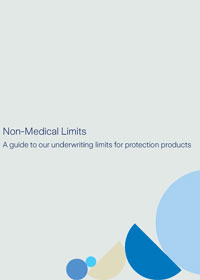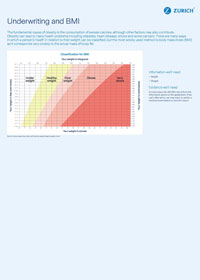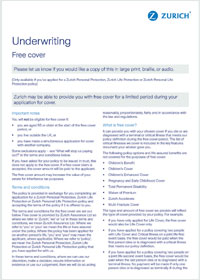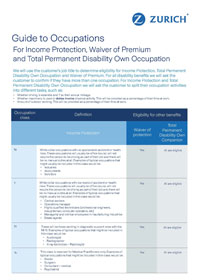Select a condition from the drop down to view information on the condition, what information we may ask for relating to the condition and likely terms we could offer.
Accelerate will not be available where there is a moderate or high risk of cancer, a risk of the need for future heart surgery or neurosurgery, or needing a bone marrow or live donor organ transplant; this includes any situations where Life cover would attract a rating of more than +50%.
To get indicative underwriting decisions specific to your customer for all benefits, please use our pre-app tool on the Life Protection Platform.
The condition can then be selected from the drop down list:
Angina is chest pain caused by restricted blood flow to the heart muscles. This could be a warning sign that your client is at risk of having a heart attack or stroke. It’s possible to control the symptoms through treatment and lifestyle changes, subsequently reducing the risk of more serious problems.
Information we'll need from your client:
- How long ago it was diagnosed
- Date of last symptoms
- Details of any outstanding tests, investigations, consultations or referrals.
Evidence we'll require
Where terms may be possible, we will request a report from their GP asking for full details.
Terms we could offer for Life cover:
| Angina | Life |
|---|---|
| Mild/moderate stable angina | +50% up |
| Severe angina or with complications | Unable to offer |
Life cover may not be offered:
- If the customer is 40 or younger
- If If the application is made within six months of the diagnosis, or the condition is considered unstable
- If the customer has also been diagnosed with diabetes
We are unable to offer any of the following benefits: Critical Illness, Income Protection, Total permanent disability, Waiver of premium or Accelerate.
Arthritis is a range of disorders that cause pain and inflammation in a joint. This could result in restricted mobility, or in more severe cases, problems with other tissues and organs in the body. The two most common types or arthritis are osteoarthritis and rheumatoid arthritis.
Information we’ll need from your client
- Client’s age
- Type of arthritis
- Affected joint(s)
- Details of any operations completed or awaited including dates
- Frequency and severity of symptoms
- Details of any outstanding tests, investigations, consultations or referrals.
- Treatment required
Evidence we’ll require
If we are unable to make a decision from the client’s disclosures alone, we will request a report from the GP asking for full details.
Terms we could offer
| Osteoarthritis | Life | Critical illness | Income protection | Total permanent disability | Waiver of premium |
|---|---|---|---|---|---|
| Mild | Standard | Standard | Standard or exclude* | Standard or exclude* | Unable to offer |
| Moderate | Standard | Standard | Exclude / Unable to offer* | Exclude / Unable to offer* | Unable to offer |
| Severe | Standard | Standard | Exclude / Unable to offer* | Exclude / Unable to offer* | Unable to offer |
*Terms depend on occupation and number of joints affected
| Rheumatoid arthritis | Life | Critical illness | Income protection | Total permanent disability | Waiver of premium |
|---|---|---|---|---|---|
| Mild | Standard to +50% up | Standard | Exclude | Exclude / Unable to offer | Unable to offer |
| Moderate | 75% up | +50 up | Unable to offer | Unable to offer | Unable to offer |
| Severe | +100% up | Unable to offer | Unable to offer | Unable to offer | Unable to offer |
When terms may not be offered
- Rapidly progressive or highly disabled
- Associated vasculitis or interstitial lung disease.
Asthma is a common lung condition that results in occasional breathing difficulties, coughing and chest tightness. Preventative treatment with inhalers usually controls these symptoms, however, more severe symptoms may require treatment with tablets. If not controlled, asthma could lead to tiredness, mental illness and lung infections. A severe asthma attack could be life-threatening.
Information we’ll need from your client
- Frequency and severity of symptoms including date of last symptoms
- Treatment received both past and present
- Details of any hospital admissions
- Impact on daily work and personal activities
- Details of any outstanding tests, investigations, consultations or referrals.
Evidence we'll require
If we are unable to make a decision from the client’s disclosures alone, we will request a report from the GP asking for full details.
| Asthma | Life | Critical illness | Income protection | Total permanent disability | Waiver of premium |
|---|---|---|---|---|---|
| Mild | Standard | Standard | Standard | Standard | Standard |
| Moderate | +50% | Standard | +75% | Standard | Unable to offer |
| Severe | +100% up | +75% up | +100% up | Unable to offer | Unable to offer |
People who have asthma and smoke may attract a +25% to +50% on top of the outcomes above depending on the daily amount smoked.
Other factors that may impact terms include hospital admissions and associated disorders such as Chronic Obstructive Airway Disease (COPD).
If there has been no symptoms or treatment for more than 2 years prior to the application, we may be able to offer standard terms for all products.
When terms may not be offered
Poorly controlled asthma with a history of hospital admissions and significant treatment such as oral steroids.
Back pain is very common and in most cases not caused by anything serious. With the correct treatment this usually gets better over time, however, the pain can sometimes last a long time or keep coming back. Treatment is usually in the form of therapy, such as physiotherapy, with more significant back pain requiring a combination of therapy and medication or even surgery.
Information we’ll need from your client:
- Frequency and severity of symptoms including date of last symptoms
- Treatment received both past and present
- Impact on daily work and personal activities
- Details of any operations completed or awaited including dates
- Details of any outstanding tests, investigations, consultations or referrals
Evidence we’ll require
In most cases we will offer terms from the information provided on the application. If we are unable to do so then we will request a report from the GP asking for full details.
Terms we could offer
| Back pain | Life | Critical illness | Income protection | Total permanent disability | Waiver of premium |
|---|---|---|---|---|---|
| Mild | Standard | Standard | Standard / Exclude | Standard / Exclude | Standard / Unable to offer |
| Moderate | Standard | Standard | Exclude | Exclude | Unable to offer |
| Severe | Standard | Standard | Exclude / Unable to offer | Exclude / Unable to offer | Unable to offer |
When terms may not be offered
- With nerve root compression causing neurological deficit (including bowel or bladder problems)
- Significant impact on health and wellbeing
Breast lumps have lots of different causes. Usually there is a harmless cause such as a non-cancerous growth or an infection (mastitis), however, sometimes there is a more sinister cause such as cancer.
Information we’ll need from your client
- Diagnosis including cause, if known
- Whether any change in size and shape
- Details of any treatment completed or awaited including dates
- Outcome of any tests or investigations
Evidence we’ll require
If we are unable to make a decision from the client’s disclosures alone, we will request a report from the GP asking for full details.
Terms we could offer
| Breast lump | Life | Critical illness | Income protection | Total permanent disability; | Waiver of premium | Accelerate |
|---|---|---|---|---|---|---|
| Benign - fully documented | Usually standard | Usually standard | Usually standard | Usually standard | Usually standard | Usually standard |
| Fibroadenoma (simple) - fully documented | Usually standard | +50% and exclude | Usually standard | +50EM | Usually standard | Usually standard |
| Fibroadenoma (complex) - fully documented | Usually standard | Exclude | Usually standard | Usually standard | Usually standard | Unable to offer |
Terms will be dependent on the exact diagnosis
When terms may not be offered:
Confirmed malignant
The fundamental cause of obesity is the consumption of excess calories, although other factors may also contribute. Obesity can lead to many health problems including diabetes, heart disease, stroke and some cancers. There are many ways in which a person's health in relation to their weight can be classified, but the most widely used method is body mass index (BMI) as it corresponds very closely to the actual mass of body fat.
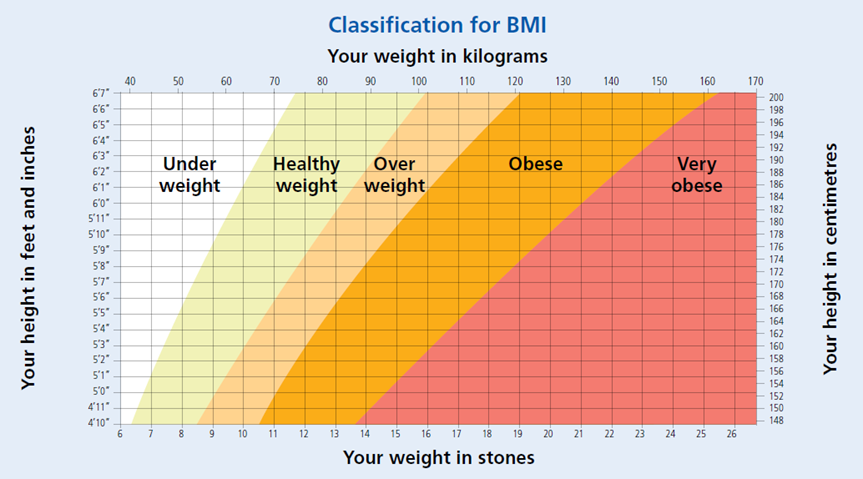
Information we’ll need from your client:
- Height
- Weight
Evidence we’ll require
In most cases we will offer terms from the information provided on the application. If we are unable to do so then we may need to obtain a medical examination or doctor’s report.
Terms we could offer
| BMI | Life | Critical illness | Income protection | Total permanent disability | Waiver of premium |
|---|---|---|---|---|---|
| <19 - Underweight | Medical evidence or Low rating | Medical evidence or Low rating | Medical evidence or Low rating | Medical evidence or Low rating | Medical evidence |
| 19–24 - Healthy weight | Standard | Standard | Standard | Standard | Standard |
| 25–28 - Overweight | Standard | Standard | Standard | Standard | Standard |
| 29–34 - Obese | Standard to Low rating | Standard to Low rating | Standard to Low rating | Standard to Low rating | Standard / Unable to offer |
| 35–39 - Severely obese | Low to Moderate rating | Low to Moderate rating | Low to Moderate rating | Low to Moderate rating / Unable to offer | Unable to offer |
| >39 - Morbidly obese | Moderate to High rating / Unable to offer | Moderate to High rating / Unable to offer | Unable to offer | Moderate to High rating / Unable to offer | Unable to offer |
When terms may not be offered:
Associated risk factors present such as heart disease, raised blood pressure or cholesterol.
Accelerate will be unavailable for any customers where the BMI attracts a Moderate to High rating for Life or Critical Illness due to the higher risk of cancer and heart disease.
Cancer is a condition where cells in a specific part of the body grow and reproduce uncontrollably. The cancerous cells can invade and destroy surrounding healthy tissue, including organs. Cancer sometimes begins in one part of the body before spreading to other areas. This process is known as metastasis.
There are more than 200 types of cancer, the most common being:
- Breast cancer
- lung cancer
- Prostate cancer
- Bowel cancer
Information we’ll need from your client
- How long ago it was diagnosed
- Type of cancer and whether it has spread
- Details of any treatment completed or awaited including dates
- Outcome of any tests or investigations
- Details of any outstanding tests, investigations, consultations or referrals
- Any details such as TNM scores, Gleason scores or staging information will be very helpful
Evidence we’ll require
Where terms may be possible, we will request a report from the GP asking for full details.
Terms we could offer
Cancer is a complex condition to underwrite and our decision will be based on many factors such as cancer type, size, treatment and time since treatment completed. Terms range from standard to being unable to offer terms. Where terms are possible for critical illness, Cancer will be excluded in addition to any rating.
When terms may not be offered
- Incomplete treatment
- Uncontrolled growth
- Stage 3 or higher
- Diagnosis within the last 2 years
- Not discharged by specialist unless for annual review only
- If there are any outstanding tests, investigations or referrals
Cholesterol is a fatty substance known as a lipid that is vital for the normal functioning of the body. Having an excessively high level of lipids in the blood (hyperlipidaemia) can have an effect on health and could lead to serious health problems such as heart disease and stroke. Lipid levels can usually be controlled through diet and exercise or a drug known as a statin.
Information we’ll need from your client
- Frequency of cholesterol checks
- Treatment received
- Last total cholesterol levels or how these were described
- Details of any tests, investigations, consultations or referrals completed or awaited
Evidence we’ll require
In most cases we will offer terms from the information provided on the application. If we are unable to do so then we may need to obtain a medical examination or doctor’s report.
Terms we could offer
Where the lipid levels are normal and controlled we will usually allow standard terms.
When terms may not be offered
- Uncontrolled raised lipid levels
- Poor compliance with treatment
Crohn’s disease is a chronic inflammation commonly affecting the intestine, but which may also affect any part of the gastrointestinal tract. Symptoms include diarrhoea, weight loss and rectal bleeding and can be a risk factor for colonic cancer.
Information we’ll need from your client
- How long ago it was diagnosed
- The number and severity of attacks
- Treatment received including whether surgery has taken place
- Details of any tests, investigations, consultations or referrals completed or awaited
Evidence we’ll require
In most cases we will offer terms from the information provided on the application. If we are unable to do so then we will request a report from the GP asking for full details.
Terms we could offer
| Crohn’s disease | Life | Critical illness | Income protection | Total permanent disability | Waiver of premium |
|---|---|---|---|---|---|
| Minor symptoms responding to simple remedies | Standard to +100% up | +25% to +100% | Standard to +50% or exclusion | +25% to Unable to offer* | Unable to offer |
| Symptoms requiring steroid treatment and or hospital admission | +25% up | +25% up | Postpone | +25% to Unable to offer* | Unable to offer |
| Continuing symptoms requiring surgical treatment, complications such as weight loss | +100% up | +75% up/Unable to offer | Unable to offer | Unable to offer* | Unable to offer |
*Total Permanent Disability may be offered on a “Activity of Daily Work” definition if ‘Own Occupation’ is not offered
When terms may not be offered
- Surgery within the last 6 months
- Significantly underweight with active disease
- Requires nutrition through a tube
- Liver function abnormalities
- If diagnosis or a major attack in the last year we could only consider terms for Life cover
A chronic condition associated with abnormally high blood sugar levels due to the body’s inability to produce sufficient insulin (or to respond to the insulin it produces). With Type 1 diabetes – no insulin is produced by the body and insulin injections are required. With type 2 diabetes – not enough insulin is produced by the body, or the body produces insulin but becomes resistant to it. Complications linked to diabetes include heart disease, stroke, kidney failure and blindness.
Information we’ll need from your client
- Type of diabetes
- Date diagnosed
- Details of any associated complications such as kidney, foot or eye problems
- Any hospital admissions
- Length of time off work, if any
- Latest HbA1c, blood sugar or how these were described to the client e.g. normal – well controlled, Borderline – close to normal etc.
Evidence we’ll require
If we are unable to make a decision from the client’s disclosures alone, we will request a report from the GP asking for full details.
Terms we could offer
| Type 1 diabetes | Age | Life cover |
|---|---|---|
| Well controlled on treatment, no complications | <30 | +200% / Unable to offer |
| 30-39 | +150% / +200% | |
| 40-49 | +125% / +175% | |
| 50-59 | +100% / +150% | |
| 60+ | +75% / +125% | |
| Average control, no complications | <30 | +225% / Unable to offer |
| 30-39 | +175% / Unable to offer | |
| 40-49 | +150% / +200% | |
| 50-59 | +125% / +175% | |
| 60+ | +100% / +150% | |
| Inadequate control, OR presence of risk factors including raised blood pressure and obesity | <30 | Unable to offer |
| 30-39 | Unable to offer | |
| 40-49 | +200% / Unable to offer | |
| 50-59 | +175% / Unable to offer | |
| 60+ | +150% / Unable to offer |
These outcomes are based on the diagnosis being made in the last 6 years. Where the condition was been diagnosed more than 6 years ago any loadings may be higher or we may be unable to offer terms.
When terms may not be offered:
- there is a history of heart disease, stroke or diagnosis of chronic kidney disease
- the customer is under age 40 and has high blood pressure, high cholesterol or family history of heart disease/stroke
- the customer's BMI is 38 or more
- the customer is a smoker
- the customer latest HbA1c blood test result over 10.5% / 91 mmol/mol
We are unable to offer any of the following benefits: Critical Illness, Income Protection, Total permanent disability, Waiver of premium or Accelerate.
| Type 2 diabetes | Age | Life | Critical illness | Income protection |
|---|---|---|---|---|
| Well controlled on treatment, no complications | <30 | +150% up | Unable to offer | Unable to offer |
| 30-39 | +100% up | Unable to offer | Unable to offer | |
| 40-49 | +75% up | +100EM / Unable to offer | +125% / Unable to offer | |
| 50-59 | +50% up | +75% / Unable to offer | +100% / Unable to offer | |
| 60-69 | +25% up | N/A | N/A | |
| Average control, no complications | <30 | +200% to Unable to offer | Unable to offer | Unable to offer |
| 30-39 | +150% up | Unable to offer | Unable to offer | |
| 40-49 | +125% up | +100% / Unable to offer | +125% / Unable to offer | |
| 50-59 | +100% up | +75% / Unable to offer | +100% / Unable to offer | |
| 60-69 | +75% up | Unable to offer | N/A | |
| Inadequate control, OR presence of risk factors including raised blood pressure and obesity | <30 | Unable to offer | Unable to offer | Unable to offer |
| 30-39 | +200% / Unable to offer | Unable to offer | Unable to offer | |
| 40-49 | +175% / Unable to offer | Unable to offer | Unable to offer | |
| 50-59 | +150% / Unable to offer | +150% / Unable to offer | +150% / Unable to offer | |
| 60-69 | +125% / Unable to offer | +125% / Unable to offer | N/A |
These outcomes are based on the diagnosis being made in the last 6 years. Where the condition was been diagnosed more than 6 years ago any loadings may be higher or we may be unable to offer terms.
When terms may not be offered:
- there is a history of heart disease, stroke or diagnosis of chronic kidney disease
- the customer is under age 40 and has high blood pressure, high cholesterol or family history of heart disease/stroke
- the customer's BMI is 38 or more
- the customer latest HbA1c blood test result over 10.5% / 91 mmol/mol
- for Critical Illness or Income Protection where the customer is a smoker
We are unable to offer any of the following benefits: Critical Illness Select, Critical Illness Enhanced, Critical Illness Enhanced Plus, Total permanent disability, Waiver of premium or Accelerate.
A brain disorder that causes recurring seizures. The seizures happen when clusters of nerve cells, or neurons, in the brain send out the wrong signals. It is usually diagnosed following an electroencephalogram(EEG). There are many types of epilepsy including simple and complex partial seizures, tonic-clonic seizures and absence seizures.
Information we’ll need from your client
- Diagnosis including type
- Date of diagnosis
- Frequency and severity of attacks
- Date of last seizure
- Treatment received and/or any ongoing treatment or medication
- Outcome of any tests or investigations
Evidence we’ll require
If we are unable to make a decision from the client’s disclosures alone, we will request a report from the GP asking for full details.
Terms we could offer
| Epilepsy | Life | Critical illness | Income protection | Total permanent disability | Waiver of premium |
|---|---|---|---|---|---|
| Diagnosis in the last 6 months for life and CIC, 12 months for IP | Postpone | Postpone | Postpone | Postpone | Postpone |
| Absence seizures (petit mal) | Standard to +50% | Standard to +50% | Standard to Unable to offer | Standard to Unable to offer* | Unable to offer |
| Tonic-Clonic seizures (grand mal) | Standard to +150% | Standard to unable to offer | +75% up / Unable to offer | Standard to unable to offer | Unable to offer |
*Total Permanent Disability may be offered on a “Activity of Daily Work” definition if ‘Own Occupation’ is not offered
When terms may not be offered
- Full evaluation/investigation incomplete
- Diagnosed less than 6 months ago
- Multiple episodes of status epilepticus
- Presence of personality changes
- Alcohol misuse
- Non-compliance with treatment
Information we’ll need from your client
- How many family members had breast cancer
- Family members ages at diagnosis
- Details of any screening scans or doctor recommendations
Evidence we’ll require
Immediate terms are typically possible at point of sale.
Terms we could offer
Life cover outcomes typically range from standard to +50%.
Critical Illness will typically either have a breast and ovarian cancer exclusion or a +50% rating with a less advanced cancer exclusion.
Income protection outcomes typically range from standard to +50% rating.
Total Permanent Disability will either be standard, have an exclusion or a +50% rating.
Terms may not be offered when multiple family members had breast cancer and the life assured decided to not attend any recommended screening/mammogram/scans, or have not discussed their family history with a health professional.
For explicit guidance please visit the Pre-Application tool within the adviser portal.
| Family history of type 1 or 2 diabetes | Life | Critical illness | Income protection | Total permanent disability | Waiver of premium |
|---|---|---|---|---|---|
| One family member diagnosed before age 60 | Standard | Standard for CI cover, diabetes exclusion for CI select, CI enhanced and CI enhanced plus (type 1 family history only) | Standard | Standard | Standard |
| Two family members diagnosed before age 60 Customer BMI 18-27 | Standard | Standard for CI cover, diabetes exclusion for CI select, CI enhanced and CI enhanced plus (type 1 family history only) | Standard | Standard | Unable to offer |
| Two family members diagnosed before age 60 Customer BMI 28+ | 25% plus rating for BMI | +25% and a diabetes exclusion for CI select, CI enhanced and CI enhanced plus (type 1 family history only) plus rating for BMI | 25% plus rating for BMI | +25% plus rating for BMI | Unable to offer |
| Family history of heart disease, heart attack or stroke | Life | Critical illness | Total permanent disability | Waiver of premium |
|---|---|---|---|---|
| One family member with a stroke only any age | Standard | Standard | Standard | Standard |
| Two family members with strokes only | ||||
| Customer <55 | +25% | +50% | +50% | Unable to offer |
| Customer 55+ | Standard | Standard to +25% | +25% | Standard |
| One family member with heart disease or heart attack | ||||
| One aged under 45 | Standard | +25% | +25% | Unable to offer |
| One age 45+ | Standard | Standard | Standard | Standard |
| Two family members with heart disease or heart attack | ||||
| At least one of the family members under age 45 | +25% to +50% | +25% to +50% | +25% to +50% | Unable to offer |
| Two age 45+ | +25% | +25% to +50% | +25% to +50% | Unable to offer |
| Combination of stroke and heart disease | Use the heart disease outcomes as a guidance, specific outcomes will depend on the specific conditions and the age at diagnosis | |||
| Three or more family members of any combination of heart disease or stroke | Outcome will be tailored based on the number of relatives, their ages and the customers own risk for example BMI. | |||
The medical term for a heart attack is ‘myocardial infarction’ and occurs when the blood flow through the heart vessels is blocked. The heart muscle becomes starved of oxygen and is permanently damaged as a result. The main symptoms of a heart attack include chest pain, shortness of breath and dizziness.
Information we’ll need from your client
- Age at diagnosis
- Severity of the heart attack
- All investigations completed
- Any treatment given
- Details of smoking history, height and weight, blood pressure and cholesterol readings
Evidence we’ll require
We will request a report from the GP asking for full details.
Terms we could offer for Life cover
| Heart Attack | Life |
|---|---|
| Heart attack | +100% upwards |
| Heart attack, ongoing chest pain/complications | Unable to offer |
When terms may not be offered for Life cover:
- Under age 45 at the time of the application
- Heart attack within the last 6 months
- Continuing unstable angina
- Severe ongoing symptoms
- Also suffering with diabetes or had a stroke or TIA
We are unable to offer any of the following benefits: Critical Illness, Income Protection, Total permanent disability, Waiver of premium or Accelerate.
High blood pressure is also known as hypertension and means the heart has to work harder to pump blood around the body, increasing the risk of developing heart disease or suffering a stroke. Hypertension rarely has any noticeable symptoms, the only way to find out if your blood pressure is high is to have it checked.
Information we’ll need from your client
- How long ago it was diagnosed
- Treatment received both past and present
- Latest blood pressure reading
- Details of any tests, investigations, consultations or referrals completed or awaited
Evidence we’ll require
If we are unable to make a decision from the client’s disclosures alone, we will request a report from the GP asking for full details.
Terms we could offer
| High blood pressure | Life | Critical illness | Income protection | Total permanent disability | Waiver of premium |
|---|---|---|---|---|---|
| Well controlled on treatment with no associated risk factors | Standard to +50% | Standard to +75% | Standard to +50% | Standard / Unable to offer | Standard / Unable to offer |
| Less well controlled on treatment, some associated risk factors | 75% to 175% | +100% up / Unable to offer | +75% to +100% | Unable to offer | Unable to offer |
| Poor control or non-compliant with treatment, associated risk factors (smoking, high cholesterol, obesity) | +200% to unable to offer | Unable to offer | +125% up / Unable to offer | Unable to offer | Unable to offer |
When terms may not be offered
- Non-compliant with treatment
- Poorly controlled
- Associated risk factors including smoking, high cholesterol and obesity
A common condition that affects the digestive system causing stomach cramps, bloating, diarrhoea and constipation. The cause is unknown but is linked to diet, stress and family history. It can become a lifelong problem, treated through dietary changes and medicine.
Information we’ll need from your client
- How long ago it was diagnosed
- Details of any treatment completed or awaited including dates
- Outcome of any tests or investigations
- Details of any outstanding tests, investigations, consultations or referrals
- Length of time off work, if any
Evidence we’ll require
If we are unable to make a decision from the client’s disclosures alone, we will request a report from the GP asking for full details.
Terms we could offer
| Irritable Bowel Syndrome (IBS) | Life | Critical illness | Income protection | Total permanent disability | Waiver of premium |
|---|---|---|---|---|---|
| Full investigated, any severity | Standard | Standard | Standard to +50% | Standard | Standard |
When terms may not be offered
We would rarely not offer terms for a definite diagnosis of Irritable Bowel Syndrome alone.
There are a number of disorders affecting the renal system that may affect the kidney’s performance to filter blood and remove any waste products. Common kidney disorders include renal calculus (kidney stones) and nephritis (inflammation).
Information we’ll need from your client
- Age at diagnosis
- Type of kidney condition
- Any investigations completed
- Treatment received
- Current reading of renal function blood test
Evidence we’ll require
If we are unable to make a decision from the client’s disclosures alone, we will request a report from the GP asking for full details.
Terms we could offer
| Kidney disorder | Life | Critical illness | Income protection | Total permanent disability | Waiver of premium |
|---|---|---|---|---|---|
| Simple kidney infection or renal calculus | Standard to +75% | Standard to +50% | Standard to +50% | Standard to +50% | Standard / Unable to offer |
| Moderate nephritis | +25% to +175% | +125% to Unable to offer | +125% to Unable to offer | Unable to offer | Unable to offer |
| Severe nephritis | +200% to Unable to offer | Unable to offer | Unable to offer | Unable to offer | Unable to offer |
When terms may not be offered
- Evidence of severe or worsening kidney function
- Diagnosed with diabetes
- Poorly controlled blood pressure
A type of skin cancer that can spread to other organs within the body. The most common sign of a melanoma is the appearance of a new mole or a change to an existing mole. The biggest cause of melanoma is over exposure to ultraviolet light from the sun.
Information we’ll need from your client
- Age at diagnosis
- Type of melanoma including staging
- Treatment given
Evidence we’ll require
Where terms may be possible, we will request a report from the GP asking for full details.
Terms we could offer
Cancer is a complex condition to underwrite and our decision will be based on many factors such as cancer type, size, treatment and time since treatment completed. Terms range from standard to being unable to offer. Where terms are possible for critical illness, Cancer will be excluded in addition to any rating.
When terms may not be offered
- Simultaneous melanomas
- Incomplete treatment
- Stage 4 melanomas
A mental health condition affects a person’s thinking, feeling or mood. There are a wide range of conditions including stress, anxiety, depression, bi-polar disorder and schizophrenia. Mental health conditions present various risk factors including time off work, alcohol and drug misuse, poor lifestyle choices resulting in other conditions such as heart disease.
Information we’ll need from your client:
- How long ago it was diagnosed and when the last symptoms were
- Treatment received both past and present
- Details of any treatment including hospital treatment
- Impact on daily work and personal activities
- Length of time off work, if any
- Whether any suicide attempts, self-harm or thoughts to do either
- Type of mental health condition
Evidence we’ll require
If we are unable to make a decision from the client’s disclosures alone, we will request a report from the GP asking for full details.
Terms we could offer
| Mental health condition | Life | Critical illness | Income protection | Total permanent disability | Waiver of premium |
|---|---|---|---|---|---|
| Mild anxiety or depression | Standard to +25% | Standard to +50% | Standard to exclude | Standard / Unable to offer* | Standard or Unable to offer |
| History of moderate or severe depression | +50% up | Standard to +50% | Exclude or Unable to offer | Standard or Unable to offer* | Unable to offer |
| Current or recurrent moderate or severe depression | +75% to Unable to offer | +50% up Exclude on CI select, CI enhanced and enhanced plus / Unable to offer | Unable to offer | Unable to offer | Unable to offer |
*Total Permanent Disability may be offered on a “Activity of Daily Work” definition if ‘Own Occupation’ is not offered
When terms may not be offered
- Suicide attempt within the last year or recurrent suicide attempts or self-harming within the last two years
- Suicidal thoughts within the last year
- Associated alcohol or drug abuse, current or in the past
An inflammatory disease of the central nervous system. Signs and symptoms include muscle weakness, tremor, disturbance of speech and vision, and bladder dysfunction. The most common type of multiple sclerosis (MS) is described as relapsing remitting MS. It’s characterised by recurrent attacks of symptoms with periods of remission in between. With progressive MS, symptoms continue to get worse over time, with no distinct periods of remission.
Information we’ll need from your client
- Age at diagnosis
- Type of MS
- Date of last attack
- Severity of symptoms
- Investigations completed
- Treatment given
Evidence we’ll require
We will request a report from the GP asking for full details.
Terms we could offer for Life cover
| Multiple sclerosis | Life |
|---|---|
| Minimal signs with no disability | +50% up |
| Minimal disability but self sufficient | +100% to +175% |
| Disability preventing work, requires assistance with mobility | +200% / Unable to offer |
When terms may not be offered for Life cover
Severe functional limitation i.e. ataxia, speech or swallowing difficulty.
We are unable to offer any of the following benefits: Critical Illness, Income Protection, Total permanent disability, Waiver of premium or Accelerate.
A stroke occurs when there is permanent damage to part of the brain caused by a sudden interruption in the blood supply. This can be due to a blockage in one of the blood vessels supplying the brain or a bleed in the brain. Most strokes occur when a blood clot blocks an artery.
Information we’ll need from your client
- Age at diagnosis
- Type of stroke
- Severity of symptoms
- Date investigations completed
- Treatment given
- Any ongoing disability or complications
Evidence we’ll require
We will request a report from the GP asking for full details
Terms we could offer for Life cover
| Stroke | Life |
|---|---|
| Single episode, full recovery | Postpone within 6 months/+100% up |
| Single episode, residual symptoms | Postpone within 6 months/+200%/ Unable to offer |
| More than one attack or single attack with complications | Postpone within 6 months/+200%/ Unable to offer |
When terms may not be offered for Life cover:
- When the client also has diabetes
- Diagnosed less than 6 months ago
- Severe disability affecting daily living
We are unable to offer any of the following benefits: Critical Illness, Income Protection, Total permanent disability, Waiver of premium or Accelerate.
Chronic inflammation of the colon and rectum due to the formation of small ulcers that can bleed and produce pus. The main symptoms include diarrhoea, stomach pain and tiredness.
Information we’ll need from your client
- Age at diagnosis
- Frequency of attacks
- Date of last attack
- Investigations completed
- Treatment given including any surgery
Evidence we’ll require
If we are unable to make a decision from the client’s disclosures alone, we will request a report from the GP asking for full details.
Terms we could offer
| Ulcerative colitis | Life | Critical illness | Income protection | Total permanent disability | Waiver of premium |
|---|---|---|---|---|---|
| Medical treatment only, mild to moderate infrequent symptoms | Standard to +50% | Standard to +50% CI select, CI enhanced and CI enhanced plus - exclusion - bowel disease and less advanced cancer; colon, rectum, small intestine | +25% to +50% | Standard to Unable to offer* | Standard / Unable to offer |
| Frequent relapses requiring hospital admissions or use of oral steroids | +50% to +100% | +50% upwards CI select, CI enhanced and CI enhanced plus - exclusion - bowel disease and less advanced cancer; colon, rectum, small intestine | +75% to +100%/exclusion | Unable to offer* | Unable to offer |
| Continuing symptoms requiring continual oral steroids | +75% to Unable to offer | +75% to Unable to offer CI select, CI enhanced and CI enhanced plus - exclusion - bowel disease and less advanced cancer; colon, rectum, small intestine | Unable to offer | Unable to offer* | Unable to offer |
*Total Permanent Disability may be offered on a “Activity of Daily Work” definition if ‘Own Occupation’ is not offered
When terms may not be offered
- Less than 6 months since diagnosis
- Underweight or unstable weight loss
- Surgery is being contemplated
Zurich Learning Hub
Your flexible learning hub — offering on-demand resources, bite-sized videos, interactive sessions, and expert insights to help you grow, your way.
Useful links

Claims
Visit our claims page for information on how to claim and up to date claims statistics.

Zurich Support Services
An independent team of counsellors, advisers and legal experts are there for your client and their family.

Large case underwriting team
A bespoke service for high value applications or large case underwriting.

